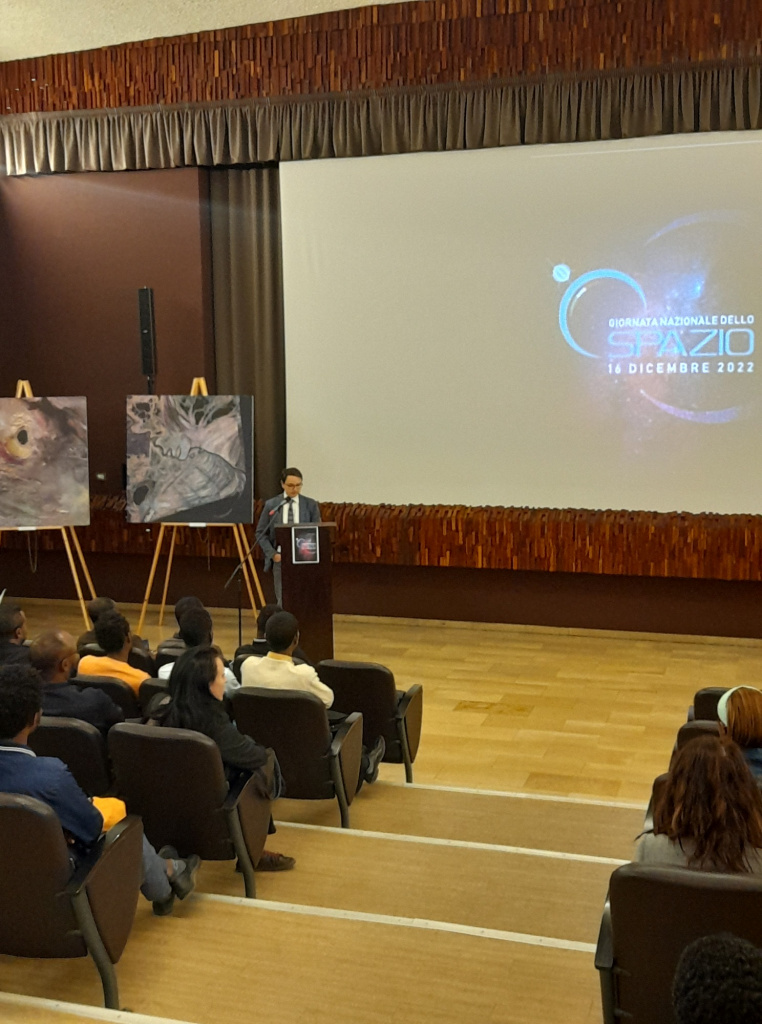Report on Europlanet Workshop ‘Applications of Earth Observation Satellite Data’
This article is a translation of the original article by UNIBO Magazine in Italian, reposted with kind permission.
The second Europlanet 2024 RI Workshop, “Applications of Earth Observation Satellite Data”, coordinated by the University of Bologna and Italian Cultural Institute (Ministry of Foreign Affairs and International Cooperation) was held in Addis Ababa at the Italian Cultural Institute (IIC) in Ethiopia. The event was sponsored by the Italian Space Agency and the National Institute of Astrophysics.
Space is now an objective of strategic importance for African countries. Africa looks to space as a valuable tool for the support, competitiveness and growth of the continent. Africa’s Agenda 2030 and Agenda 2063 set out its future objectives to transform it into a strong, resilient and influential actor and partner on the global scene, and to have the right to a share of global common goods: land, oceans and space.
Now, the Europlanet 2024 Research Infrastructure project and its Global Collaboration and Integration Development programme coordinated by Prof. Barbara Cavalazzi of the University of Bologna, aim to address the challenge of creating a network for planetary sciences in Africa at a national and international, favoring intra-African relations.
Recently, 38 participants from all over Ethiopia attended an international workshop in person. The attendees were professionals, researchers and PhD students from the Universities of Addis Ababa, Mezan Tepi, Semera, Wollo, Wolkite, Oda Bultum, but also from the Ethiopian Space Science and Technology Institute, the Space Science and Geospatial Institute, the Ethiopian Institute of Agricultural Research, the Ethiopian Forest Development, the Ethiopian Roads Administration, all linked by common interests such as Earth observation, use of satellite images and related applications.
Barbara Cavalazzi explains: “The format I chose for this event was to provide high-quality content, examples of applications, and practical workshops for using the software, with kind support from high-profile instructors (Gabriele Bitelli and Francesca Trevisiol, University of Bologna, Patrizia Sacco, Italian Space Agency, Addisu Gezahegn, Addis Ababa University and Gemechu Fanta Garuma, Space Science and Geospatial Institute). In parallel, times for discussion and sessions were organised for the exchange of ideas on research in the field of Earth observation. Interaction between the participants themselves was encouraged, laying the foundations for the formation of a local community of specialists on the subject. And I can say that we have achieved the goal”.
“We are happy to welcome so many participants to this workshop from all over Ethiopia, in conjunction with the National Space Day celebrations,” says Dr. Semen Kumurzhi, Director of the Italian Cultural Institute. “The initiatives promoted are part of the strategy to relaunch our cultural and integrated programme in this country and represent an important moment of dialogue, in particular with a young generation of local scientists and researchers. These activities will help to raise the profile of our country in Ethiopia in a modern and innovative way. It is an excellent example of collaboration between the University of Bologna and the other national organistions (Embassy of Italy, ASI, INAF), whom I sincerely thank. We hope that the results of these projects lead to medium to long-term partnerships, so that we can support the development of space and planetary science in Ethiopia and Africa for years to come.”
“Earth observation through satellite images represents a fundamental tool for the monitoring and management of the territory. The educational programme of the workshop included theoretical lessons supported by practical sessions with open-source software, providing students with the tools to use remote sensing images to support their own research or professional activity. Possible applications, which emerged as priorities from the participants, included the monitoring of agriculture in the context of food security, the prevention of natural disasters, the monitoring of surface water and drought, together with the other environmental problems that climate change is making increasingly evident,” explain Gabriele Bitelli and Francesca Trevisiol at the end of the workshop.
The workshop, which ended on 16 December, coincided with the second National Space Day, during which the “LOOKING BEYOND/Guardare Oltre” satellite image exhibition (curated by F. Maggia) set up at the IIC was inaugurated. The programme was enriched by a series of workshops “Let’s light up the constellations” held by Dr. Federico Di Giacomo of INAF-Astronomical Observatory of Padua, and organized in collaboration with Dr Maura Sandri of INAF and Prof Barbara Cavalazzi, which involved nearly 200 students from the Galileo Galilei Italian school in Addis Ababa.












University of Bologna participation was by Barbara Cavalazzi, Professor in the Department of Biological, Geological and Environmental Sciences, who coordinated the workshop, and Gabriele Bitelli and Francesca Trevisiol, Professor and doctoral student in the Geomatics group of the Department of Civil, Chemical, Environmental and Materials Engineering, who participated in the initiative. The event was organised with the support of Europlanet 2024 RI, which received funding from the European Union’s Horizon 2020 program (Grant No 871149).

